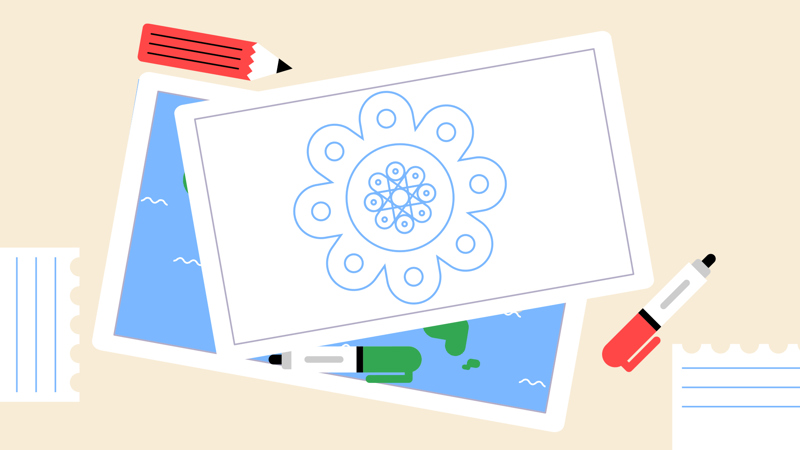
Henna hands
You’ll need
- A4 paper
- Brown pens
- World map
Scouts is open to everyone. We don’t identify exclusively with one faith, and we welcome people of all faiths and of none.
We know it’s important for people to learn about each other, including understanding different faiths and beliefs. Scouts always respects people’s beliefs, faiths and cultures, and everyone should be open to learn.
As an inclusive and values based movement, we support our members to engage and learn about different faiths and beliefs in an exciting and meaningful way, even if they don’t have a faith themselves.
Celebrating and understanding differences, including differences in faiths and beliefs, is an important part of our Scout values, which are:
- Integrity: We act with integrity; we are honest, trustworthy and loyal.
- Respect: We have self-respect and respect for others.
- Care: We support others and take care of the world in which we live.
- Belief: We explore our faiths, beliefs and attitudes.
- Co-operation: We make a positive difference; we co-operate with others and make friends.
Our value of Belief and its exploration helps Scouts to learn from other faiths and beliefs. This encourages them to develop or build their personal beliefs and understand their shared values, whether faith-based on not.
We know that learning about faiths, beliefs and different attitudes can help to break down barriers, helps us all to recognise what we have in common, and teaches us to value and respect other people. It also helps us to build up respect, acceptance and knowledge for each other, leading to a more co-operative and inclusive society.
In our diverse society, people can sometimes feel cautious talking about this sensitive subject. However, it's important that Scouts offers young people safe, exciting and open spaces to explore faiths and beliefs. They should be able to engage in personal reflection, as they question and develop their opinions and understanding of the world around them.
Making time for personal reflection and developing our beliefs means exploring the places, people, communities, celebrations or stories which hold meaning for us, and it may not necessarily mean exploring a faith.
For example, someone’s shared values may be their Scout Values and that person may choose to reflect on them at important times, such as when they make their Promise. Others may choose to reflect at certain times of the year, such as a faith-based festival, birthdays, meaningful events or at New Year. Some people may still celebrate events, such as Christmas, but use it as a time to celebrate family, friends and loved ones, as well as for charity and giving.
Discover more about Faiths and Beliefs in Scouts.
Before you begin
- Use the safety checklist to help you plan and risk assess your activity. Take a look at our guidance to help you carry out your risk assessment, including examples.
- Make sure all young people and adults involved in the activity know how to take part safely.
- Make sure you’ll have enough adult helpers. You may need some parents and carers to help if you’re short on helpers.
Learn about henna
- Gather everyone together. Ask if anyone knows what henna is, and everyone should share their ideas.
- Explain that Henna’s a plant that’s crushed and mixed with water to make a brown paste. The paste is painted onto hands and feet, and it stains the skin for between one and four weeks. People create beautiful designs, especially for special celebrations such as weddings and festivals.
- You could show everyone the examples of henna designs, and tell everyone that these are sometimes called Mehndi.
- Ask everyone should think about where henna is common and share these ideas.
- Explain that henna designs are common in counties including India, Pakistan, Bangladesh, and Afghanistan. Everyone should try and find these countries on the world map.
- If anyone has a connection to these countries, or knows anything about them, they could share what they know with the group. Some people may even have had henna themselves, or seen family members or friends with it.
Make a henna hand
- Everyone should draw around their hand and wrist on a piece of A4 paper and cut it out. People could work in pairs, and draw around a friend’s hand, if that’s easier.
- Next, people can draw intricate designs on their paper hands. They should be inspired by the traditional henna patterns, because this activity is all about taking part in an activity from another country.
- People may want to use brown pens, as this reflects a common colour used to make Henna patterns. Black henna isn’t safe to use on skin.
- Everyone should show their henna hands to the group and admire everyone’s designs.
Reflection
This activity helped you to respect others, and reminded you that you’re an international citizen. Learning about international traditions can help us understand and trust people from different backgrounds. Everyone should sit and put their henna hands in front of them. They should look at their hands—how do we use our hands to celebrate or express ourselves? We might clap, or fingerspell, or wave our hands to show clapping in British Sign Language (BSL). We may also shake hands with people, or wave. Not everyone uses henna, but lots of people use their hands in different ways to express themselves.
Safety
All activities must be safely managed. You must complete a thorough risk assessment and take appropriate steps to reduce risk. Use the safety checklist to help you plan and risk assess your activity. Always get approval for the activity, and have suitable supervision and an InTouch process.
You could give people patterns to trace or copy, or you could up the challenge by giving them a part of a pattern to create a design from.
You can offer ideas to start the patterns off.
People can help each other draw around their hands and start off their designs.
All Scout activities should be inclusive and accessible.
You could use the henna hands as decorations for an Eid party at the end of Ramadan, the Muslim month of fasting. Parents and carers could share food, games, and other traditions with the group. If everyone joins in with trying food, or learning to say hello and goodbye in another language, they’ll be working towards their International Activity Badge. Someone may even be able to do a henna demonstration or show their mehndi patterns.
